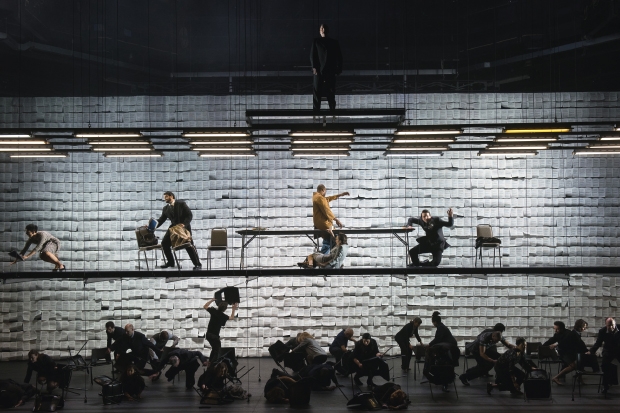Spoiler alert: it’s all a dream. At least, I think that’s what we’re meant to take away from the business with which director James Brining accompanies the overture to Mozart’s The Magic Flute. A little girl in ochre pyjamas is trying to sleep while in an adjacent room braying, guffawing adults sit down to a formal dinner. Servants bustle about, and there’s a suggestion that all is not well in the hosts’ marriage. Then sleep descends with a David Lynch-like fizzle of electric lights and we’re pitched into a world of princes, serpents and enchantment.
Opera directors love unloading on overtures: obscuring the composer’s own musical pathway into their world with elaborately mimed footnotes to a text you haven’t yet read. It’s Brining’s only major miscalculation, and one that might perhaps be remedied by taking a billhook to about 75 per cent of that quaffing and faffing. Bank the idea of a divided family in a convention-bound society, remember that little girl, and then enjoy an imaginative, compassionate and slightly spooky ride through Mozart and Schikaneder’s Enlightenment fairy tale.
So dream logic prevails, and that’s fine. Dream logic is what gives The Magic Flute both its ramshackle narrative coherence and its profound truth. Artur Schnabel supposedly said that Mozart’s piano sonatas are too simple for children but too difficult for adults, and in my experience it’s only adults who struggle with The Magic Flute. Kids get it. The girl (she doesn’t receive a distinct credit in the programme) pops up throughout the action — part Nutcracker Clara, part Alice in Wonderland, charmingly indicating the best possible perspective from which to understand all this stuff about bird-catchers and sevenfold signs of the sun.
Colin Richmond’s sets create a shifting labyrinth of grand hallways and corridors, lit with an eerie De Chirico glow and occasionally transforming into a forest of trees with blood-red roots. Video projections make it all feel very fluid, and crowds of lost children march about. Sarastro (John Savournin) swirls his cape like Ming the Merciless while his gender-segregated followers wear cultish maroon, with the women in wimples. Yep, that again: The Handmaid’s Tale is fast becoming a cliché of contemporary opera production, and it’s not always apposite. Sarastro is a creation of the 1790s, but he rules by consensus and Mozart (if not Schikaneder) makes it unambiguous that he stands for good. Deny that truth, attach too much significance to the whole Margaret Atwood schtick, and you’re left with a Flute as broken and reductive as Netia Jones’s version at Garsington last summer.
Brining avoids that trap. The human failings of this world are revealed with a light touch (John Findon’s pale, male Monostatos is more ludicrous than menacing in his grubby nightshirt), and Sarastro’s priests vote by secret ballot to bring about the changes that he knows to be necessary. At each stage, we see the orderly dissolution of the old rules: male and female disciples break ranks and mingle after Tamino (Kang Wang) and Pamina (Vuvu Mpofu) jointly transcend the trials by fire and water. Headscarves come off and children run to greet their parents as sunlight bathes the final chorus.
If that moment of liberation feels earned, it’s probably also because the individual performances are so sympathetic. A likeable Papageno can carry a Magic Flute a long way, and Gavan Ring’s scruffy carrot-topped bird-catcher sings with a pleasant voice and easy articulation. The production is in English (as usual for this opera in the UK) and the Leeds crowd warmed audibly to Ring’s Irish accent and occasional ‘Feck!’ Samantha Hay was the Queen of the Night; ardent as well as imperious, she just gets better and better in this role, and her top notes practically scorched the retinas. Wang’s rather constricted tenor soared only intermittently, though his air of determined decency was certainly sufficient for a fairy-tale prince in a child’s dream.
Still, it’s no great surprise that Pamina emerges as the central character, though it helped that Mpofu had the most naturally expressive voice on stage — a translucent, subtly shaded soprano that had an intense sweetness when it arced upwards, as well as pathos at the ends of phrases: all shaped and controlled by Mpofu with a delicacy that was sincerely touching. The Opera North orchestra under Robert Howarth went all out for colour and character, and the guileless way Howarth underlined a melody with earthy bassoon or plangent oboe evoked Haydn — the beloved father-figure to whom Mozart had said farewell (for the last time, as it turned out) a few months before starting work on The Magic Flute. Coincidence, surely, but one of many ways in which this production opens new and illuminating pathways through an opera that ought to be intractable but which — in loving hands — feels more and more like a sort of miracle.






Comments